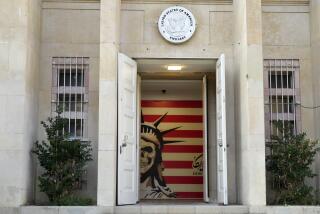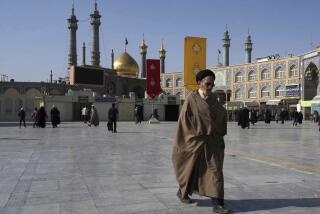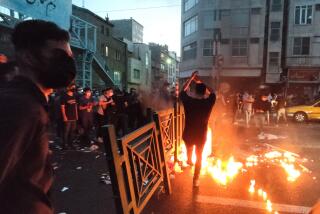History Is Impervious to Zeal : Iran Was Too Fragile to Transform All of Islam
- Share via
Iran’s acceptance of a cease-fire with Iraq surprised Western officials, Soviet officials, everyone, not least the Ayatollah Ruhollah Khomeini, who swallowed the bitter poison of abandoning the war only after being persuaded that his Islamic revolution would otherwise collapse.
Why such universal surprise? Probably because we, like the Iranians themselves, had become mesmerized by the conviction that the powers of ideological zeal are limitless.
We had witnessed during the previous decade the enormous transformations wrought by the Islamic revolution. It changed not only Iran’s system of government and foreign policy but also its political language, its values, its outlook, its sense of itself, its sense of others, the ways in which its people dressed and thought, and the readiness of many of those people to lay down their lives and their children’s lives, apparently gladly and gratefully, for the holy and eternal cause in whose name the Islamic Republic had been established. Moreover, the revolution had inspired calls for emulation in like-minded communities of Shias elsewhere and utter panic in countries it excoriated as insufficiently Islamic and in need of their own transformations.
If the revolution could do all that, then perhaps, given its limitless zeal--plus its bottomless well of bitterness and its endless capacity for martyrdom--it could do anything, including win any war it declared holy, whether with a rival local power or an intrusive but far-less-committed superpower.
We, and the Iranians, should have known better.
To be sure, self-sacrificing, unquestioning zeal, fueled by one or another ideology, whether religious or political or nationalistic, is a powerful force. It has figured centrally in all successful revolutions, including our own, and has been responsible for the spread of religions as well as self-liberation from foreign domination.
But as powerful a force as zeal may be, it’s not enough to achieve lasting national and international change. It wasn’t in times past--in the time of the Crusaders, for example--and it isn’t now. Zeal has to understand and accommodate itself to power. Unless the divinity in whose name the zeal is unleashed--or the machinery of history posited by one or another revolutionary secular ideology--acts palpably, visibly and miraculously in the affairs of men,men themselves have to achieve and manipulate power in order to gain their ends. And, in order to do that, they have to use, in efficient and effective ways, the primary instruments of power--modern armies, productive economies and competent political structures.
All of these instruments of power involve material and organizational arrangements that have evolved, and grown ever more robust, over the centuries. Zeal, on the other hand, is no more powerful than it was millennia ago, when human beings first developed faiths and visions that they tried to protect and, sometimes, impose on others. Though always a strong spur to struggle, zeal is, in relative terms, ever less effective as modern war relies ever more on advanced weapons and the sophisticated systems that deliver them, on healthy and mixed economies, and on flexible political organizations. To be effective in the waging of war, these structures require not only domestic stability but also reasonably functioning relations with at least some foreign allies. Certainly, it’s difficult for a country that isn’t militarily and economically self-sufficient to maintain all of these structures if it destroys working relations with most other countries by excoriating or threatening them or by supporting forces that terrorize or in other ways undermine them.
Moreover, zeal, insofar as it promotes self-sacrifice, conflicts in the long run with a human urge that is even more powerful--the urge for self-preservation. As the long run has gotten longer in Iran, we have seen self-preservation win out over zeal. We have seen not only growing opposition to the war but also public demonstrations against it, along with ever greater difficulty in recruiting soldiers for the front.
We might have reduced our estimation of the power of the Iranians’ zeal for the war when we reduced our estimation of the power of terrorists’ zeal for suicidal death. A few years ago, we were convinced that legions of enthusiastic, self-sacrificing Shia car-bombers would obliterate everyone who opposed their cause in Lebanon and then spill over that country’s borders to do the same every-where else. Only later did we learn that such legions didn’t exist, that most car-bombers had been tricked or pushed into service; perhaps only a few were true zealots who could be roused to explode themselves through the gates of Paradise.
Religious zeal, which is a state of total commitment, is dangerously likely, when its goals fail, to result in a state of total disillusionment. History records the great losses of faith experienced by religious orders when predicted messianic comings have failed to occur. Alternatively, and in some ways no less devastatingly, zeal, when it fails to win a war, can result in an abandonment not only of the war but also of all participation in righteous struggle; that struggle is then left to God, who--as the Ayatollah explained in the radio address in which he justified abandonment of the war--will go on fighting the war and moving history in some other way.
Certainly, we haven’t seen the end of Iran or the Islamic Republic. The wellsprings of zealous faith that were tapped by the Ayatollah were, and remain, real and deep. And the logic that is the motor of that faith remains unchanged and capable of immense force. It is a logic that says that there is only one true faith; that there is only one true interpretation of that faith; that it must have sole political power; that it must be in power everywhere; that whatever stands in its way is an abomination and must be destroyed; that in destroying, one risks being destroyed, but if one is so destroyed, so martyred, one achieves the faith’s highest pinnacle and richest reward.
This is a logic that will survive the abandonment of the war and continue to infuse the revolution. But it is a logic that has been, at least for the time being, redirected. Having led the faithful into a political and military cul-de-sac, having exhausted itself in the struggle, and having faced the likelihood of extinction if the struggle continues, this logic, and the leaders who have articulated it, must pause for rest and reformulation. What emerges may be, as some Iraqis fear, merely a reinvigorated revolution with unchanged goals. More likely, it will be a more mature revolution, one that understands its political achievement and appreciates its fragility, and one that is willing, for now and perhaps generations, to leave the struggle against the unbelieving world, and the zeal that goes with it, to God and God’s ways.
More to Read
Sign up for Essential California
The most important California stories and recommendations in your inbox every morning.
You may occasionally receive promotional content from the Los Angeles Times.













